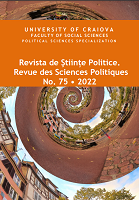Improving Academic Outcomes and Behaviours through SEL (Social and Emotional Learning)
Improving Academic Outcomes and Behaviours through SEL (Social and Emotional Learning)
Author(s): Costina Denisa BărbuceanuSubject(s): History of Education, Educational Psychology, State/Government and Education, Individual Psychology, Social psychology and group interaction, Human Resources in Economy, Socio-Economic Research, Sociology of Education
Published by: Editura Universitaria Craiova
Keywords: social and emotional learning (SEL); academic performance; job and life satisfaction; learning environment; future employability;
Summary/Abstract: It is said that social and demonstrative skills are indicators of how well a person adapts to the social setting, acclimates and changes, and ultimately the success she/he will have in lifespan. In fact, basic developmental skills such as meticulousness, emotional stability, openness, and the ability to be pleasant may be even more important than cognitive intelligence in determining future employability. Despite the fact that these skills are linked to central life outcomes, it can be challenging for teachers to find operative ways to rank, teach, and evaluate social and emotional skills. The expansion of these indispensable life skills through social and emotional learning (SEL) is critical for students' progress, as it is directly related to their success and contentment as adults. For many future students, school is the only place where any deficiency in these skills can be spoken before they become adherents of society. Combining these skills with academic development creates high-quality learning experiences and versatile education environments, (Stoian, 2019a; Stoian, 2019b) that empower students today to be more effective contributors in their lecture rooms and, tomorrow, in their workplaces or groups. The development of these skills has shown several positive results, including better academic outcomes, enhanced attitudes, behaviours and relationships with peers, as well as a deeper linking to faculty, fewer acts of misbehaviour and also less emotional distress (students with depression), unease, pressure or social withdrawal.
Journal: Revista de Științe Politice. Revue des Sciences Politiques
- Issue Year: 2022
- Issue No: 75
- Page Range: 181-188
- Page Count: 8
- Language: English

